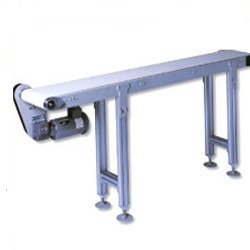Difference between revisions of "Steel Slat Conveyors"
(Created page with "Category:Conveying{{Knoppen}} <noinclude><!------------------------------------------------ * READ THIS FIRST * Only edit this page if you can improve the content. * Imprope...") |
|||
| Line 7: | Line 7: | ||
* Please start editing this page after the /noinclude | * Please start editing this page after the /noinclude | ||
* -------------------------------------------------></noinclude> | * -------------------------------------------------></noinclude> | ||
[[File:Steel slat conveyor.jpg|right|thumb|Steel Slat Conveyors]] | |||
'''Steel Slat Conveyors''' are predominantly used, and are ideal in such industries as food and pharmaceuticals, where rapid speed and accuracy is of the utmost importance, plus they also have the ability to be washed down for hygiene purposes.Steel slat conveyors are used for conveying heavy products over longer distances and can be manufactured in mild steel or stainless steel. | |||
Steel slat conveyors are also used for heavier industry, where the conveyor needs to be built to a very robust design, especially when handling heavy steel products such as automotive parts , punched/pressed parts , etc. | |||
As they are generally situated in dirty and possibly wet conditions, the slats tend to be stainless, rather than mild steel, as their life expectancy would be greater. | |||
Latest revision as of 22:00, 27 August 2012
Steel Slat Conveyors are predominantly used, and are ideal in such industries as food and pharmaceuticals, where rapid speed and accuracy is of the utmost importance, plus they also have the ability to be washed down for hygiene purposes.Steel slat conveyors are used for conveying heavy products over longer distances and can be manufactured in mild steel or stainless steel.
Steel slat conveyors are also used for heavier industry, where the conveyor needs to be built to a very robust design, especially when handling heavy steel products such as automotive parts , punched/pressed parts , etc.
As they are generally situated in dirty and possibly wet conditions, the slats tend to be stainless, rather than mild steel, as their life expectancy would be greater.
